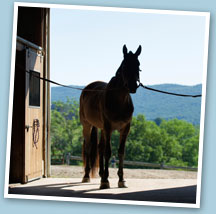
How to keep your yard safe
Looking after your horse’s home is vitally important for their physical and mental health. Here, eight equine experts share their advice for making sure horses are safe from harm while being secure and happy in their surroundings.
Consider electric gates
Sarah Hallows, dressage trainer and rider
‘My yard is near a very busy, fast road and has two gates meaning we have to be very strict about closing them, especially when we’re leading horses through. Ideally, it’d be good to have electric gates, which close automatically.’
Keep it clean
Gil Riley, Petplan Equine’s veterinary expert
‘Try to remove all poo and decaying hay and straw, and drain away stagnant water as all these things are the perfect breeding ground for flies. Yards where such material is lying around have much higher levels of fly bites and sweet itch. Muck heaps should either be covered or removed completely.’
Use information boards
Emma Lacey, sanctuary farms manager at Redwings
‘We recommend that anyone who looks after a particular horse jots down important information to share with stable hands and owners. It means that in an emergency, a horse can get the correct medical intervention and that everyone involved knows if the horse has any special requirements. For example, a horse might need extra care around their ears when putting the head collar on.’
Ban smoking
Vicki Alford, Blue Cross Burford horse unit manager
‘Due to the large amount of flammable materials found around stables, all yards should have a strict no smoking policy and the use of a naked flame should be avoided. Keep the walkways, and the yard itself, free from discarded hay and bedding. Practise fire alarm procedures regularly so that everyone knows the drill, and, of course, fire equipment should be well maintained and serviced often.’
Avoid horse theft
Jacko Jackson, field officer at World Horse Welfare
‘Aside from microchipping your horse, check that all your boundary fencing is secure. Could the gate be lifted off its hinges, for example? You could involve other local owners in a horse watch group or install security lights that detect movement. A pricier option would be to club together for a CCTV system. It’s also a good idea to lock away your horse’s passport, as it is illegal to sell a horse without one.’
Keep busy
Rachel Angell, operations manager at Redwings
‘Boredom is a big factor in field-related equine accidents. Using a slow hay feeder box helps to keep horses occupied, while stable toys and mirrors can offer entertainment if they’re stuck in stables for long periods. If it’s unsafe to ride due to poor weather, keep your horse’s mind sharp with groundwork exercises, such as, “Go!”, “Stop!” and “Park!”, using the equitation science training principles. It’s great for bonding with your horse, too.’
Be prepared
Sally Billing, trainer and event rider
‘I take the contact and medical details of every client who comes into my yard so I’m covered if there is an accident. This includes their spouse’s contact details. Fingers crossed there’s no need to refer to these but it’s certainly better to have them than not. And for cross-country lessons, I insist that all my riders wear their medical armband, which contains all the medical details and contact information of the rider.’
Safe grazing
Vet Karen Coumbe from Bell Equine Veterinary Clinic
‘Ragwort can cause serious and irreversible damage to horses’ livers, so it needs to be removed from all fields where your horse will graze or from which hay is cut. Don’t be tempted to pull out plants and leave them in the field, as wilted ragwort is more palatable to horses and just as toxic.
Acorns and sycamore seeds can also be fatally toxic, so grazing areas under these trees should be fenced off and sufficient supplementary feed provided. Do a perimeter walk around all the areas where your horse will be spending time, to ensure there are no overhanging branches or toxic plants at ground level. You may want to read Petplan Equine’s article on safe foraging for more on this subject.’



